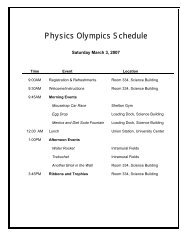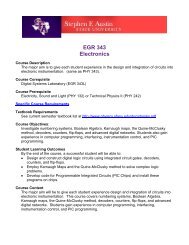Walter Trikosko - Physics & Astronomy - Stephen F. Austin State ...
Walter Trikosko - Physics & Astronomy - Stephen F. Austin State ...
Walter Trikosko - Physics & Astronomy - Stephen F. Austin State ...
You also want an ePaper? Increase the reach of your titles
YUMPU automatically turns print PDFs into web optimized ePapers that Google loves.
SUGGESTIONS FOR MAKING A GOOD GRADE:<br />
• Read your textbook.<br />
• Attend classes regularly and punctually.<br />
• Read your textbook.<br />
• Review both lecture and laboratory material daily<br />
(Don’t cram).<br />
• Read your textbook.<br />
• Participate fully in lab exercises.<br />
• Read your textbook.<br />
• Develop and practice good note taking skills.<br />
• Read your textbook.<br />
• Ask questions in class.<br />
ACADEMIC INTEGRITY: Academic integrity is a responsibility<br />
of all university faculty and students. Faculty<br />
members promote academic integrity in multiple ways<br />
including instruction on the components of academic<br />
honesty, as well as abiding by university policy on penalties<br />
for cheating and plagiarism.<br />
Definition of Academic Dishonesty<br />
Academic dishonesty includes both cheating and<br />
plagiarism. Cheating includes but is not limited to (1)<br />
using or attempting to use unauthorized materials to aid<br />
in achieving a better grade on a component of a class;<br />
(2) the falsification or invention of any information,<br />
including citations, on an assigned exercise; and/or (3)<br />
helping or attempting to help another in an act of<br />
cheating or plagiarism. Plagiarism is presenting the<br />
words or ideas of another person as if they were your<br />
own. Examples of plagiarism are (1) submitting an<br />
assignment as if it were one's own work when, in fact, it<br />
is at least partly the work of another; (2) submitting a<br />
work that has been purchased or otherwise obtained from<br />
an Internet source or another source; and (3)<br />
incorporating the words or ideas of an author into one's<br />
paper without giving the author due credit.<br />
Read the complete policy at<br />
http://www.sfasu.edu/policies/academic_integrity.asp<br />
WITHHELD GRADES POLICY: Ordinarily, at the<br />
discretion of the instructor of record and with the approval<br />
of the academic chair/director, a grade of WH will be<br />
assigned only if the student cannot complete the required<br />
course work because of unavoidable circumstances.<br />
Students must complete the work within one calendar<br />
year from the end of the semester in which they receive a<br />
WH, or the grade automatically becomes an F. If students<br />
register for the same course in future terms the WH will<br />
automatically become an F and will be counted as a<br />
repeated course for the purpose of computing the grade<br />
point average.<br />
The circumstances precipitating the request must have<br />
occurred after the last day in which a student could<br />
withdraw from a course. Students requesting a WH must<br />
be passing the course with a minimum projected grade of<br />
C.<br />
STUDENTS WITH DISABILITIES: To obtain disability<br />
related accommodations, alternate formats and/or<br />
auxiliary aids, students with disabilities must contact the<br />
Office of Disability Services (ODS), Human Services<br />
Building, Room 325, 468-3004 / 468-1004 (TDD) as early<br />
as possible in the semester. Once verified, ODS will<br />
notify the course instructor and outline the<br />
accommodation and/or auxiliary aids to be provided.<br />
Failure to request services in a timely manner may delay<br />
your accommodations. For additional information, go to<br />
http://www.sfasu.edu/disabilityservices/.


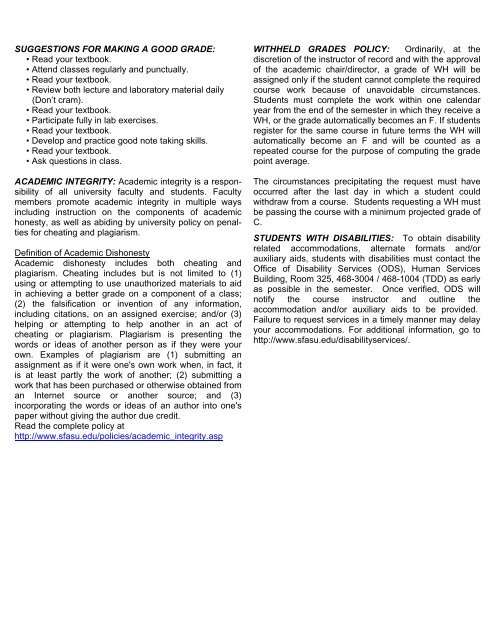

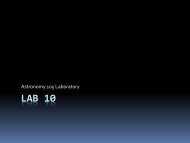
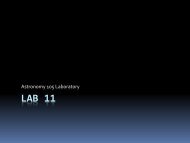
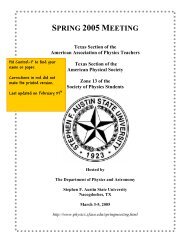
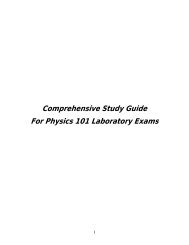
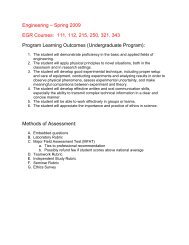
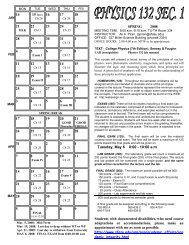
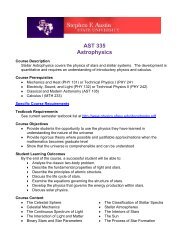
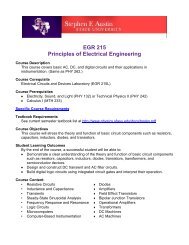
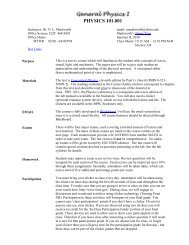
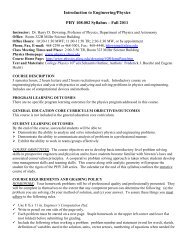
![[pdf] physics 110 fundamentals of electronics](https://img.yumpu.com/29312006/1/190x245/pdf-physics-110-fundamentals-of-electronics.jpg?quality=85)
